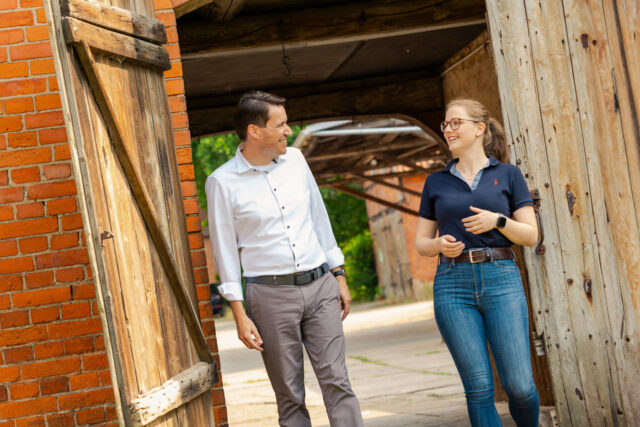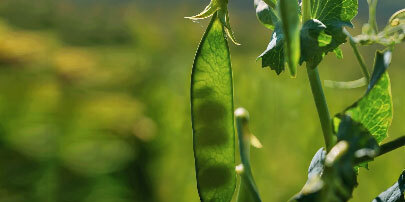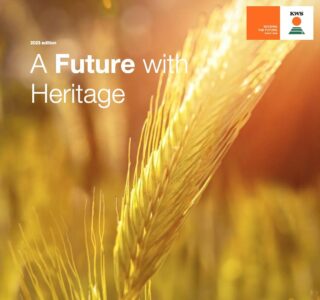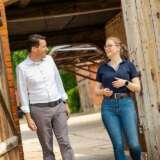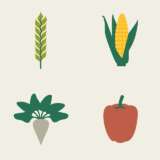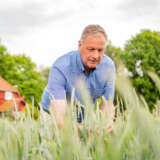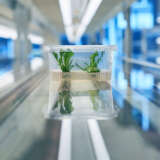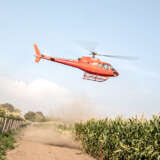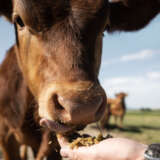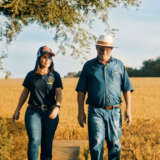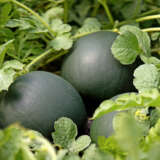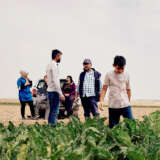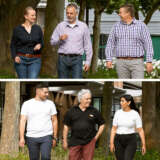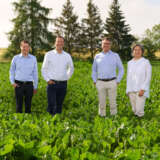Talking to farmers:
Our Spokesperson of the Executive Board on a tour of three countries.
Seeding the future for generations.
A growing world population, stagnating cultivation areas, climate change, dwindling resources and increasing nutritional awareness. Agriculture is facing an all-encompassing transformation. What are the goals of the different generations of farmers, how do they shape the dialog with society, and what demands do they place on companies such as KWS? During interesting encounters with farmers from different regions, Spokesperson of the Executive Board Felix Büchting gets a personal insight into the changes that are occurring in agriculture from the viewpoint of people who experience them every single day: Rika Schwetje, Mathieu Leveillard and Özer Çolpan explain what motivates and drives them. Three farms, three countries.
Rika Schwetje, 22 years old
- Plant technician from Gronau (Leine), Germany
- Trained plant technician studying for a bachelor’s degree in agriculture from Anhalt University of Applied Sciences in Bernburg. She is planning to do her master’s degree at the same university. However, before this, she wants to gather agricultural experience abroad and is crossing the globe to spend a year in Australia.
- Rika’s parents run a farm in Germany on an area of 160 hectares, of which 40 hectares belong to them. Alongside the traditional cash crops (sugarbeet, winter wheat, winter barley, corn, oilseed rape, spelt), the farm is also doing trials with vegetables (red cabbage, white cabbage, kohlrabi).
Interview with Rika Schwetje
Büchting Ms. Schwetje, you are writing your bachelor’s thesis and after spending a year working in Australia, you plan to start studying for a master's degree- specializing in agricultural marketing. How close is PR work to your heart?
Schwetje I believe that the gap between people who live in cities and those who live in the country has become far too large. These days, people in cities no longer have much of a connection to agriculture. It is important to reduce this gap again and to communicate a lot more with each other – and that we farmers are also emotional about our work. Transferring what we feel as farmers to other people will help.
Büchting Your passion for open and transparent communication is so strong that you have become an AgrarScout for the Forum Moderne Landwirtschaft, a German organization that promotes dialogue between agriculture and society. Sounds very pro-active, but also challenging. What does it involve exactly?
Schwetje I attended a training course at the Grüne Woche trade show to become an AgrarScout. This role gives me plenty of good opportunities to participate and contribute to public relations work. People go to the supermarket to do their shopping, but they have no idea how food is produced. And how could they, when they grow up in the city between concrete and steel and hardly ever see a tree? Knowledge about when what is harvested, knowing which fruits are local and which imported, has simply gone missing. I think it’s important that we get closer to the consumer again. And that’s a task for everyone involved in agriculture. Food alone is a passion in itself – how many food stories are posted on social media like Instagram? Consumers need to be able to find that in agriculture too.
Büchting Haven't you ever encountered difficult situations? I imagine it’s not always easy having to conduct critical or emotional discussions …
Schwetje Yes, you have to learn to stay calm. Absolutely. I’ve noticed that, when I talk to consumers, there are two different groups. There are the ones who say I have my own idea of agriculture and don’t want to be persuaded of anything else. And there are others who are interested and would like to know more. With the first group, it’s even more important to keep the conversation going and see where a small window opens up.
Büchting Obviously, your experience as an AgrarScout has not disillusioned but rather encouraged you.
Schwetje Yes, that’s true. I’ve also had conversations with people who were very upset about a farmer in their village, and called her a nature hater for spraying too much pesticide. In such situations, it’s important to stay calm, to listen and try to respond to the other person. Even if I don’t agree with them. But this could be the way to open the window for both sides to listen to each other.
We have to use more emotion when we communicate — and transfer our passion for agriculture to other people.
Rika Schwetje
Plant technician from Gronau (Leine)
Büchting You are the sixth generation on the farm. Have you had intergenerational discussions with your father about sustainability in terms of environmental protection?
Schwetje My father is always a little cautious – he observes new developments and asks my brother or me if we are familiar with a specific topic or if I have come across it in my studies. We encourage him to try out new things. For example, we bought a computer-controlled pesticide sprayer – and he knows that whenever he buys new equipment and changes to more modern technologies, it will benefit the next generation.
Büchting Speaking of the next generation – to whom will the passion for farming be passed on in your family? And how do you feel about taking the step from school to farming life?
Schwetje My brother and sister and I are the next generation. My brother will probably take over the farm. He’ll be beginning his apprenticeship there when he finishes school and is already very excited. And my little sister, who’s still at school, will soon get her tractor driver’s license – I think she’ll follow a similar path. When I think back to my apprenticeship, I have to say I was really looking forward to it. I was allowed to have a say in things from an early stage, and I developed very quickly during that time too.
Büchting At your parents’ farm, how do you notice society’s expectations with regard to making agriculture more sustainable, the desire for more regionality and changes in dietary habits? For example, your farm no longer breeds livestock on a commercial basis. How do you see the future?
Schwetje With the current setup, I don’t believe that the farm will be able to exist in the future. It’s still okay for our parents, but if my brother wants to live from it as his main occupation, either the farm has to grow or new sources of income will have to be found. We are trialing the cultivation of subcultures to see what works for us and what doesn’t. Especially vegetables. I am also a great advocate of direct marketing and would like to develop and expand that here. I could look after the marketing remotely, that’s my hobby horse. In any case, direct marketing would be an area for future development, especially for vegetables.
Mathieu Leveillard | 64 years old
- Married and a father of three, Mathieu has been operating his grandparents’ farm in the community of Les Villages-Vovéens in France since 1984.
- Since then, the farm has gradually expanded, and the family now grows crops on an area of 194 hectares, consisting of wheat, barley, corn, oilseed rape, peas, potatoes and sugarbeet, including KWS varieties.
- His daughter, Justine, just recently moved into her own farm in the neighboring community of Fains la Folie. She grows corn, winter wheat, oilseed rape and peas. The plan is to merge the two operations.
Interview with Mathieu Leveillard
Büchting Mr. Leveillard, we are here in the Beauce region. On my way to you, I noticed the vast fields of cereals and sugarbeet. The weather is good, and everything seems to be growing as planned. Are you satisfied with this year’s season?
Leveillard The weather’s actually too good at the moment – we would like a bit more water. It’s a little too dry, so we need to irrigate the potatoes, for example. Our sugarbeet, wheat and barley are also suffering from the drought. We’re not watering them yet, but soon we’ll have to.
Büchting Are all of your fields irrigated?
Leveillard Most of them. All the corn, potato and sugarbeet fields, and the wheat – as far as the water quotas allow. Irrigation restrictions mean we have to make choices. This year we’re concentrating on peas, corn and potatoes. Sugarbeet comes last because it’s generally less affected by water shortages.
Büchting The Beauce region in France is a highly fertile lowland area in the Centre-Val de Loire, which today is well known for its cereals. In view of climate change, which crops do you think will play a role in the future?
Leveillard Beauce used to be known as the breadbasket of France, but today, with global warming, this reputation no longer holds true … If there’s enough water, I think corn is a very promising crop. In addition to its interesting yield potential, it has the double advantage of storing carbon and playing a role in the water cycle through its evaporation and soil-covering properties until the middle of the fall. Yes, I think corn, has a lot of promise. Sugarbeet also has potential – if we find new solutions against pests. And we will also continue to grow peas. As well as this, some farmers have started to grow sunflowers, which are very stress-tolerant. The availability of water is nevertheless an important criterion for all crops.
Büchting Drought and water scarcity are not the only challenges you will be facing in the future, though: as you just mentioned, there is also the threat of pests.
Leveillard Exactly. The tolerance of crop species to pests and diseases is becoming increasingly important. Aphids, for example, are a huge problem! We find that as soon as our sugarbeet is sown in March and April, it is immediately infested by aphids. In the past, we were able to fight them with neonicotinoids, but the use of these insecticides has recently been banned. When I began growing sugarbeet in 2009, I wasn’t familiar with the crop, but found an average harvest of up to 115 tons a compelling argument. The first year without neonicotinoids was 2020. The yield that year: 23 tons!
Büchting Just 23 tons!
Leveillard Yes, the aphids cost me almost 100 tons of my harvest. As far as we are concerned, we received compensation from the relevant authorities, which enabled us to offset some of the losses. But this is not the case for all farmers. We’re told that we treat our crops too excessively. But we have to treat them, because we have no other choice. I’m now on my third sugarbeet insecticide. If the year goes well, we can produce 70 tons, but that is the maximum. Considering that this is the livelihood of many people in the region, these developments are a major ecological problem. One sugar factory in Toury has already closed, and there is a danger of the factories in Pithiviers or Artenay also disappearing at some point.
So, finding a solution against aphids in sugarbeet would be a key issue for you …
Mathieu Leveillard
Farmer from Les Villages-Vovéens
Büchting So, finding a solution against aphids in sugarbeet would be a key issue for you …
Leveillard Absolutely. After all, I’m not the only one suffering such substantial losses. Under these conditions, sugarbeet is not a profitable crop. Nevertheless, I bought shares in a sugar factory in 2009 all the same, and see no reason to stop growing it, as I’m convinced of its benefits. And I can see good progress being made in breeding.
Büchting Indeed. It will still take time, but our breeders are working hard on it …. Which crop are you thinking of when you talk about progress being made in plant breeding?
Leveillard I can draw a parallel with winter barley, in particular. I’m thinking of the KWS variety Joyau, a winter barley that I successfully cultivated last year. It’s untreated, so it doesn’t need chemical pesticides such as neonicotinoids. It still produced good yields, thanks to its improved genetics. These examples make me optimistic about sugarbeet and its resistance to aphids.
Büchting Your passion for agriculture has not diminished despite all the obstacles – how did you get involved in farming?
Leveillard As a child, it was livestock farming that initially appealed to me the most. We had animals, and I really liked that. And then came crop farming, which I also liked. It was almost a natural development. My sister became a journalist and my mother hoped that I would stay on our farm. So, that’s how it all came about. And I hope that the next generation will follow the same path. That’s very important to me.
Büchting You mentioned the next generation of farmers. Your daughter is very involved in agriculture, and would one day like to run her own farm, right?
Leveillard Yes. And I find that reassuring, because it’s important for me to be able to pass my parents’ farm on to the fourth generation. I consider it a privilege nowadays to be able to keep a family farm like this up and running, because they are becoming increasingly rare. To remain profitable, supermarkets and consumers must, for example, be prepared to pay more, for quality, local products. We cannot expect farmers to produce according to French standards if we import our food to make it more affordable for the consumer.
Büchting Do you know of any new ways or ideas to prepare your family business for the future?
Leveillard All in all, things are not so bad. We have acquired more land, part of which is a little further away in the Perche region. The soil there is much wetter, it has a lot of potential. However, because of the distance, I’ve simplified things and grow only one type of crop there, so that I don’t have to move the equipment and materials too often. And we’ve also made another decision: My wife and I have converted some of the buildings on the farm into gîtes – self-catering holiday apartments – for guests. It’s a diversification that I think harmonizes well with the farm. And I like to share what I do with people who don’t come from a farming background.
Büchting And we’re here on your family farm – visitors can hardly get any closer to original agriculture, I think …
Leveillard That’s true. My maternal grandparents settled here between 1918 and 1920. And when my parents got married at the end of the 1950s, they took over the farm. Later we expanded the business: In 1981, I took over another farm of about 30 hectares nearby, which we merged with ours. My father remained actively involved until 1996, and then my wife and I took over completely. So it’s a real family business!
Özer Çolpan | 47 years old
- Farmer from Odunpazarı, Turkey
- A qualified metallurgy and materials engineer by trade, Özer returned home after working for a construction company in Saudi Arabia for a year and a half to the family farm founded by his grandfather where he has now been working for 23 years. He has two children.
- The farm covers an area of 1,300 hectares, has six employees and cultivates lavender along with traditional crops (wheat and corn).
Interview with Özer Çolpan
Büchting Mr. Çolpan, please allow me to start our interview with a small personal anecdote, because for me, today, a family tradition has come full circle. Turkey has always been an important market for us, starting with sugarbeet in the 1930s. Later, corn, sunflowers and oilseed rape were added. My grandfather's first trip abroad after the Second World War was to Turkey.
Çolpan So grandfathers are important figures for both of us then. My grandfather founded this farm and thus laid the foundations for my professional development.
Büchting Although, as far as I know, your introduction to farming was more unusual than that of other farmers.
Çolpan That’s right. I’ve been working in this business for 23 years now, although I’m actually a trained metallurgical and materials engineer. I had been working for a construction company in Saudi Arabia for a year and a half when my uncle called me and asked me to come home and help on the farm. At that time, my father and my two uncles were running the business founded by my grandfather. So I got on the plane back to Turkey – and today I’m the managing director of the farm and have learned that things are not exactly easy for agriculture in Turkey.
Büchting What challenges are you facing here in your region?
Çolpan We have very dry conditions here; it’s not as wet as in Germany. The harvest period for us is always a race against time, and we have to be the faster ones. The average size of an arable holding here is six to ten hectares, and we’re dependent on state-of-the-art technology. We all have just the same narrow time frame to bring in the harvest. This is one of my major challenges: If the harvest is delayed, for example by rain, then we have to work even harder and faster. If required, I’ll hire another combine harvester to shorten the harvesting time and minimize the risk of losses. Apart from the weather, I also have to keep an eye on the global agricultural market – for example, what prices can I get for which crops, and what impact will inflation have?
Büchting Against the backdrop of climate change, you’re optimizing not only your labor but also your technology.
Çolpan Yes, this is absolutely crucial. I have a fleet of machines with many tractors in which I invest to improve our work in the fields and make it easier. My most powerful machine has a 360-hp engine. We don’t use it too often, but when we do, it solves our problems. Continuously upgrading my equipment is very important. We are also increasingly using digital tools to control our crops more intensively, for example by means of satellite monitoring. Technology is changing, machinery is changing and, as a farmer, I need to keep up with these developments. Not adapting would lead to an investment gap, and that would be hard to close again.
Technology is changing, machinery is changing – and, as a farmer, I keep up with these developments.
Özer Çolpan
Farmer from Odunpazarı
Büchting Adapting to technological improvements makes farming easier. But adapting to the changes caused by climate change needs to take place on several levels. What effects do you see on your farm?
Çolpan Irregularity on a large scale. The weather used to be stable, but in the last three or four years it has changed a lot. One year there’s no rain in winter, then the next year there’s too much, and the year after that there’s too much snow. It’s changing very drastically, and we farmers have to become more and more flexible and work with smaller time windows.
Büchting Working in and with nature is becoming the biggest factor of uncertainty for agriculture.
Çolpan Exactly – and this is a big problem for us, because it’s becoming more difficult for us to predict the weather. Long-term weather forecasts are no longer so reliable. To reduce the risks, I’ll have to be more flexible in the future and adjust my schedules.
Büchting Has this challenging time also made you aware of new perspectives of agricultural work that you now appreciate all the more?
Çolpan You know, last year we had a catastrophic hailstorm that destroyed 25 to 30 percent of the harvest in the fields. At first glance, that doesn’t look like a positive example, but in this disastrous situation I realized what problems we are able to surmount by pulling together as a team and supporting each other.
Büchting But still, at the end of the day, your business is measured in numbers.
Çolpan The past year, in particular, has shown me how loyal and trustworthy your company – KWS – has been to me as a customer, supporting me despite the uncertain situation on the world market. For this reason, and also thanks to your help, I’ve achieved positive results. I was taught by my father and uncle that you should keep your promises. Working with KWS reminds me of this lesson in a positive way.
Büchting I’m very happy to hear that. At the start of our conversation, I mentioned our special relationship with Turkey. Besides breeding and selling seed, this region is also very suitable for seed propagation, which is why we decided to increase our production capacities here, especially for sugarbeet.
Çolpan I can imagine that a good team is very important for that. It’s the same with us. Especially during harvest time, the work is very hard: Every day is Monday for farmers. I’m really very proud of my team.
